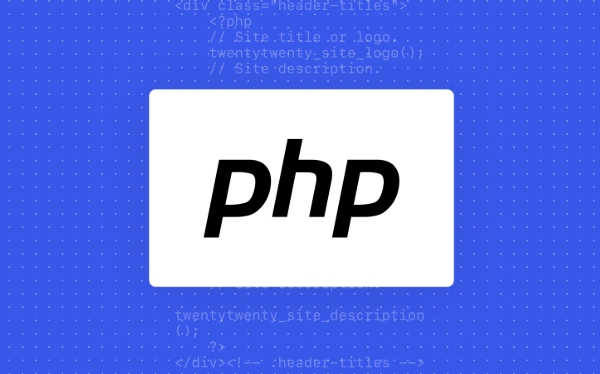Why PHP Remains Relevant for Web Development
Jul 17, 2025 am 03:43 AMPHP remains relevant in web development because it is widely used, easy to learn, and ideal for building dynamic websites quickly. 1. It powers major platforms like WordPress, Drupal, and Joomla, with WordPress alone running over 40% of all websites, ensuring continued demand. 2. It enables fast development for common web tasks through built-in web server support, seamless database integration, and ready-made frameworks like Laravel. 3. Hosting is simple and cost-effective, as shared hosting often supports PHP out of the box and deployment can be as easy as FTP file uploads. 4. Modern PHP (e.g., PHP 8) has evolved with performance improvements, better syntax, and strong backward compatibility, making it more reliable while preserving legacy systems.

PHP has stayed relevant in web development because it’s still widely used, easy to learn, and well-suited for building dynamic websites quickly. Despite newer languages and frameworks popping up, PHP powers a big chunk of the web — especially content-heavy sites like blogs, e-commerce stores, and business portals.

1. It Powers Major Platforms (And They're Not Going Away)
A huge portion of the internet runs on PHP. WordPress, which uses PHP, powers over 40% of all websites. That alone keeps PHP alive and kicking.
- Big names still use it – Facebook originally built on PHP, and even though they’ve evolved, they still use a version of it (HHVM).
- CMS reliance – Platforms like Drupal, Joomla, and Laravel-based apps rely heavily on PHP.
- Legacy systems – Many businesses aren’t rewriting their entire backend just because a new language came out. Maintaining those systems means ongoing demand for PHP developers.
So unless all those sites suddenly switch tech stacks — which isn’t happening anytime soon — PHP will keep being relevant.

2. Fast Development for Common Web Tasks
If you need to build a site that pulls data from a database and displays it — like a blog or product listing — PHP is straightforward and fast to develop with.
- Built-in web server and simple setup: You can run a basic PHP site without needing complex tools.
- Database integration is smooth: MySQL works hand-in-hand with PHP, making it easy to store and retrieve data.
- Ready-made solutions: Frameworks like Laravel offer tools for authentication, routing, and APIs out of the box.
This makes PHP ideal for small teams or solo developers who want to get something live quickly without getting bogged down in complex tooling.

3. Hosting Is Cheap and Easy
One of the underrated strengths of PHP is how easy it is to host.
- Shared hosting plans often support PHP by default — no special environment setup needed.
- Deployment can be as simple as uploading files via FTP — not every project needs Docker or CI/CD pipelines.
- Cloud providers like AWS and platforms like Heroku also have solid PHP support.
This simplicity matters, especially for small businesses or personal projects where cost and ease of maintenance are top priorities.
4. Evolving Without Breaking Everything
PHP gets a bad rap for old, messy code — and yeah, early versions weren’t great. But modern PHP (like PHP 8) is much better:
- Performance has improved a lot — JIT compilation helps speed things up.
- Type hints, better error handling, and object-oriented features make code more reliable.
- Frameworks like Laravel and Symfony follow modern practices and help keep PHP development clean and scalable.
The language has evolved while keeping backward compatibility in mind, so upgrading doesn’t always mean rewriting everything.
Basically, PHP stays relevant because it's practical, widespread, and keeps improving. It may not be the shiny new thing anymore, but it does what it does very well — and that’s enough to keep it around for a while longer.
The above is the detailed content of Why PHP Remains Relevant for Web Development. For more information, please follow other related articles on the PHP Chinese website!

Hot AI Tools

Undress AI Tool
Undress images for free

Undresser.AI Undress
AI-powered app for creating realistic nude photos

AI Clothes Remover
Online AI tool for removing clothes from photos.

Clothoff.io
AI clothes remover

Video Face Swap
Swap faces in any video effortlessly with our completely free AI face swap tool!

Hot Article

Hot Tools

Notepad++7.3.1
Easy-to-use and free code editor

SublimeText3 Chinese version
Chinese version, very easy to use

Zend Studio 13.0.1
Powerful PHP integrated development environment

Dreamweaver CS6
Visual web development tools

SublimeText3 Mac version
God-level code editing software (SublimeText3)

Hot Topics
 How to use PHP to build social sharing functions PHP sharing interface integration practice
Jul 25, 2025 pm 08:51 PM
How to use PHP to build social sharing functions PHP sharing interface integration practice
Jul 25, 2025 pm 08:51 PM
The core method of building social sharing functions in PHP is to dynamically generate sharing links that meet the requirements of each platform. 1. First get the current page or specified URL and article information; 2. Use urlencode to encode the parameters; 3. Splice and generate sharing links according to the protocols of each platform; 4. Display links on the front end for users to click and share; 5. Dynamically generate OG tags on the page to optimize sharing content display; 6. Be sure to escape user input to prevent XSS attacks. This method does not require complex authentication, has low maintenance costs, and is suitable for most content sharing needs.
 How to use PHP combined with AI to achieve text error correction PHP syntax detection and optimization
Jul 25, 2025 pm 08:57 PM
How to use PHP combined with AI to achieve text error correction PHP syntax detection and optimization
Jul 25, 2025 pm 08:57 PM
To realize text error correction and syntax optimization with AI, you need to follow the following steps: 1. Select a suitable AI model or API, such as Baidu, Tencent API or open source NLP library; 2. Call the API through PHP's curl or Guzzle and process the return results; 3. Display error correction information in the application and allow users to choose whether to adopt it; 4. Use php-l and PHP_CodeSniffer for syntax detection and code optimization; 5. Continuously collect feedback and update the model or rules to improve the effect. When choosing AIAPI, focus on evaluating accuracy, response speed, price and support for PHP. Code optimization should follow PSR specifications, use cache reasonably, avoid circular queries, review code regularly, and use X
 PHP creates a blog comment system to monetize PHP comment review and anti-brush strategy
Jul 25, 2025 pm 08:27 PM
PHP creates a blog comment system to monetize PHP comment review and anti-brush strategy
Jul 25, 2025 pm 08:27 PM
1. Maximizing the commercial value of the comment system requires combining native advertising precise delivery, user paid value-added services (such as uploading pictures, top-up comments), influence incentive mechanism based on comment quality, and compliance anonymous data insight monetization; 2. The audit strategy should adopt a combination of pre-audit dynamic keyword filtering and user reporting mechanisms, supplemented by comment quality rating to achieve content hierarchical exposure; 3. Anti-brushing requires the construction of multi-layer defense: reCAPTCHAv3 sensorless verification, Honeypot honeypot field recognition robot, IP and timestamp frequency limit prevents watering, and content pattern recognition marks suspicious comments, and continuously iterate to deal with attacks.
 PHP calls AI intelligent voice assistant PHP voice interaction system construction
Jul 25, 2025 pm 08:45 PM
PHP calls AI intelligent voice assistant PHP voice interaction system construction
Jul 25, 2025 pm 08:45 PM
User voice input is captured and sent to the PHP backend through the MediaRecorder API of the front-end JavaScript; 2. PHP saves the audio as a temporary file and calls STTAPI (such as Google or Baidu voice recognition) to convert it into text; 3. PHP sends the text to an AI service (such as OpenAIGPT) to obtain intelligent reply; 4. PHP then calls TTSAPI (such as Baidu or Google voice synthesis) to convert the reply to a voice file; 5. PHP streams the voice file back to the front-end to play, completing interaction. The entire process is dominated by PHP to ensure seamless connection between all links.
 How to use PHP to combine AI to generate image. PHP automatically generates art works
Jul 25, 2025 pm 07:21 PM
How to use PHP to combine AI to generate image. PHP automatically generates art works
Jul 25, 2025 pm 07:21 PM
PHP does not directly perform AI image processing, but integrates through APIs, because it is good at web development rather than computing-intensive tasks. API integration can achieve professional division of labor, reduce costs, and improve efficiency; 2. Integrating key technologies include using Guzzle or cURL to send HTTP requests, JSON data encoding and decoding, API key security authentication, asynchronous queue processing time-consuming tasks, robust error handling and retry mechanism, image storage and display; 3. Common challenges include API cost out of control, uncontrollable generation results, poor user experience, security risks and difficult data management. The response strategies are setting user quotas and caches, providing propt guidance and multi-picture selection, asynchronous notifications and progress prompts, key environment variable storage and content audit, and cloud storage.
 PHP realizes commodity inventory management and monetization PHP inventory synchronization and alarm mechanism
Jul 25, 2025 pm 08:30 PM
PHP realizes commodity inventory management and monetization PHP inventory synchronization and alarm mechanism
Jul 25, 2025 pm 08:30 PM
PHP ensures inventory deduction atomicity through database transactions and FORUPDATE row locks to prevent high concurrent overselling; 2. Multi-platform inventory consistency depends on centralized management and event-driven synchronization, combining API/Webhook notifications and message queues to ensure reliable data transmission; 3. The alarm mechanism should set low inventory, zero/negative inventory, unsalable sales, replenishment cycles and abnormal fluctuations strategies in different scenarios, and select DingTalk, SMS or Email Responsible Persons according to the urgency, and the alarm information must be complete and clear to achieve business adaptation and rapid response.
 Beyond the LAMP Stack: PHP's Role in Modern Enterprise Architecture
Jul 27, 2025 am 04:31 AM
Beyond the LAMP Stack: PHP's Role in Modern Enterprise Architecture
Jul 27, 2025 am 04:31 AM
PHPisstillrelevantinmodernenterpriseenvironments.1.ModernPHP(7.xand8.x)offersperformancegains,stricttyping,JITcompilation,andmodernsyntax,makingitsuitableforlarge-scaleapplications.2.PHPintegrateseffectivelyinhybridarchitectures,servingasanAPIgateway
 PHP integrated AI speech recognition and translator PHP meeting record automatic generation solution
Jul 25, 2025 pm 07:06 PM
PHP integrated AI speech recognition and translator PHP meeting record automatic generation solution
Jul 25, 2025 pm 07:06 PM
Select the appropriate AI voice recognition service and integrate PHPSDK; 2. Use PHP to call ffmpeg to convert recordings into API-required formats (such as wav); 3. Upload files to cloud storage and call API asynchronous recognition; 4. Analyze JSON results and organize text using NLP technology; 5. Generate Word or Markdown documents to complete the automation of meeting records. The entire process needs to ensure data encryption, access control and compliance to ensure privacy and security.






